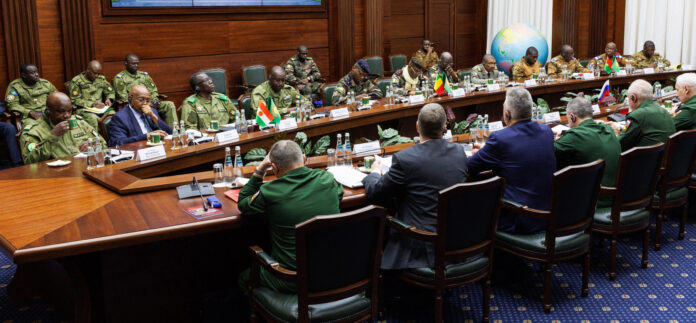Russia is moving to cement its influence in Africa’s Sahel region, hosting defence ministers from Burkina Faso, Mali, and Niger for a first-ever joint Defence Summit in Moscow. The meeting with Russian Defence Minister Andrei Belousov signalled a decisive deepening of ties between the Kremlin and the Alliance of Sahel States (AES), a security pact formed by the three military-led governments that have broken with France and distanced themselves from Western alliances.
The summit produced a joint statement and several memorandums of understanding, pledging greater cooperation on military training, arms supplies, and counterterrorism. It comes amid rising instability in the Sahel, where jihadist insurgencies linked to al-Qaeda and the Islamic State have spread despite years of Western-backed counterterrorism efforts.
From French Allies to Russian Partners
The AES, created in September 2023 and formalised as a confederation in 2024, emerged after a string of coups in Mali, Burkina Faso, and Niger. Once close military partners of France and the United States, the three states expelled French forces, restricted U.S. operations, and sought new security patrons.
Enter Moscow. Russian military instructors and equipment began arriving in Mali in 2021, in some cases linked to the Wagner Group, the Kremlin-backed mercenary network. Since then, Russia has positioned itself as an alternative guarantor of sovereignty for Sahel leaders eager to frame their legitimacy in anti-colonial terms.
“Currently, cooperation in the field of defence is the largest area of cooperation between our countries,” Mali’s Defence Minister Sadio Camara told the Moscow meeting.
Lavrov’s Courtship of the Sahel
The defence summit follows an April 2025 visit by the three Sahel foreign ministers to Moscow, where Russian Foreign Minister Sergey Lavrov launched what he called “AES-Russia consultations.” That dialogue focused on counterterrorism, political coordination, and investment.
Moscow’s Foreign Ministry has pledged arms, training—including peacekeeper preparation—and support against organised crime, in exchange for closer economic ties. Russian companies such as Rosatom, Rosneft, PhosAgro, Kamaz, and Gazprombank have been named as potential investors in African energy, mining, and infrastructure projects.
Western officials see these moves as part of a broader Russian strategy to gain footholds in resource-rich regions while displacing Western influence. “Moscow is not just offering security assistance,” one European diplomat said. “It’s positioning itself as the political and economic partner of choice for regimes cut off from the West.”
Security-for-Resources Model
Russia’s model in the Sahel echoes its approach in other African states: providing weapons and military trainers in exchange for access to natural resources, often through barter-style agreements. Similar deals have been struck with about 15 African countries.
The AES states, rich in uranium, gold, and other minerals, see these partnerships as a path to economic sovereignty. Russia, in turn, gains not only resources but also strategic leverage in a region where Western powers once dominated.
But critics argue that this “security-for-resources” formula risks perpetuating dependency rather than fostering sustainable development. Human rights groups warn that Russian-backed operations in Mali have been linked to alleged massacres of civilians, which both Moscow and Bamako deny.
The Wider Geopolitical Contest
The Sahel has become one of the most contested battlegrounds in the shifting global order. France, the former colonial power, has been forced into retreat after years of anti-French protests and military setbacks. The United States scaled back its drone operations in Niger after the July 2023 coup. Meanwhile, China, though less directly involved militarily, has expanded infrastructure projects and trade in the region.
Analysts say Russia’s courtship of the AES is part of a larger push to project influence across Africa, leveraging anti-Western sentiment to build political alliances at the United Nations and access strategic resources. “It’s about symbolism as much as substance,” said an analyst with the International Crisis Group. “Moscow presents itself as the friend of African sovereignty, even if the practical benefits remain uncertain.”
High Hopes, Unclear Outcomes
Despite the fanfare, concrete results from the Moscow defence summit were thin. No new arms deals or major investments were announced. Observers note that Russia, grappling with the costs of its war in Ukraine and Western sanctions, may struggle to meet its promises.
Still, for Burkina Faso, Mali, and Niger—isolated by regional bloc ECOWAS, targeted by Western sanctions, and battered by insurgency—the embrace of Moscow offers both political cover and the hope of survival.
Whether Russia can convert symbolic solidarity into real security and economic dividends in the Sahel remains an open question.



